Hello friends,
In the past maybe, three months, I’ve shared two posts about transfer opportunities for students who might be considering a change for various reasons. This was something I considered a while ago but never bit the bullet on. Recently, I spoke to a friend of mine Naomi, who transferred out of PTE in 2019. Naomi and I began our medical journey together at McDaniel College Budapest during the premed program. Medical school here in Hungary proved rather tough for us both and we took separate paths – I stuck through it here and she decided to leave.
Keeping in touch with Naomi, I’ve seen her thrive in her new environment and university. Today, I reached out to her to discuss her experience at PTE and her transfer process. This content is targeted to students who are curious about transferring, what it entails and how it can impact their medical school journey.
Q: Naomi, thanks for joining me today. Can you tell us a bit about yourself?
N: Yes. I’m British-Nigerian and I study medicine at the University of Novi Sad in Serbia.
Q: When were you are PTE and what did you study?
N: I studied general medicine in PTE from 2015-2019.
Q: What prompted you to leave?
N: I made the difficult decision to part ways with PTE due to the overwhelming stress that accompanied exam periods. It felt like no matter how much I studied, I couldn’t quite crack it. Sometimes it was those ultra-specific questions from teachers that threw me off, or just missing one answer despite nailing everything else. I felt my knowledge was sufficient enough to pass. I covered everything- when I mean everything, I mean I would read textbooks, students’ notes and even attend private classes.
Q: Yes I do remember how it was. Cracking the exam format here is an art of its own. I personally didn’t fully grasp it until 4th year.
N: Right. But despite feeling confident in my knowledge, the examiners seemed to see things differently. It took a toll on my mental well-being, making me doubt myself even though I knew I wasn’t lacking in intelligence. Eventually, my parents intervened and recommended that I transfer to another school for my own sake. Despite my reluctance to leave behind the friendships and routines I had established in Pécs, I took their advice and embarked on a new chapter elsewhere.
Q: What schools did you consider and why did you choose your current school?
N: I considered Victor Babes University in Timisoara, Romania due to its proximity and study program. The study program/curriculum is very similar to University of Pecs. I was not accepted because I did not fit the criteria. I got in touch with a medical school agency. They had connections with a list of schools, I hadn’t considered. They recommended Dnipro Medical Institute. I studied in Ukraine for two years until the war broke out. After the war broke out, I was devastated and was very close to giving up on finishing medicine until I stumbled upon two universities in Serbia; University of Belgrade and University of Novi Sad. I finally went with University of Novi Sad because the study program (same subjects) was also similar to University of Pecs. Additionally, unlike PTE, which has only 2 exam periods per year, UNS offers 7-10 exam periods in a year. The city is also small and everything is within reasonable reach. You can literally walk everywhere.
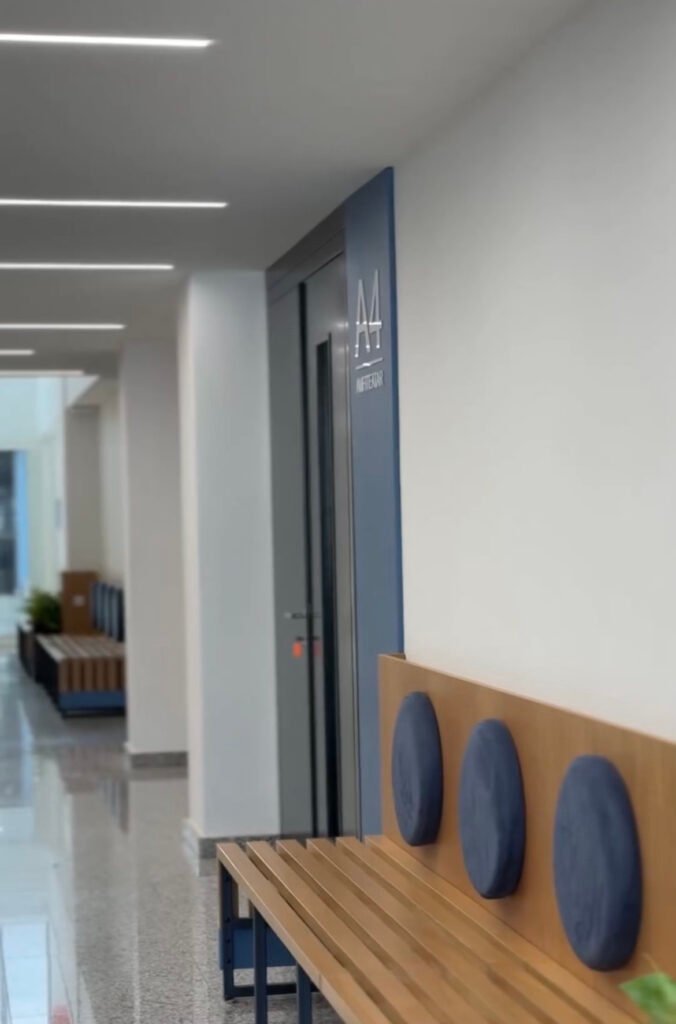
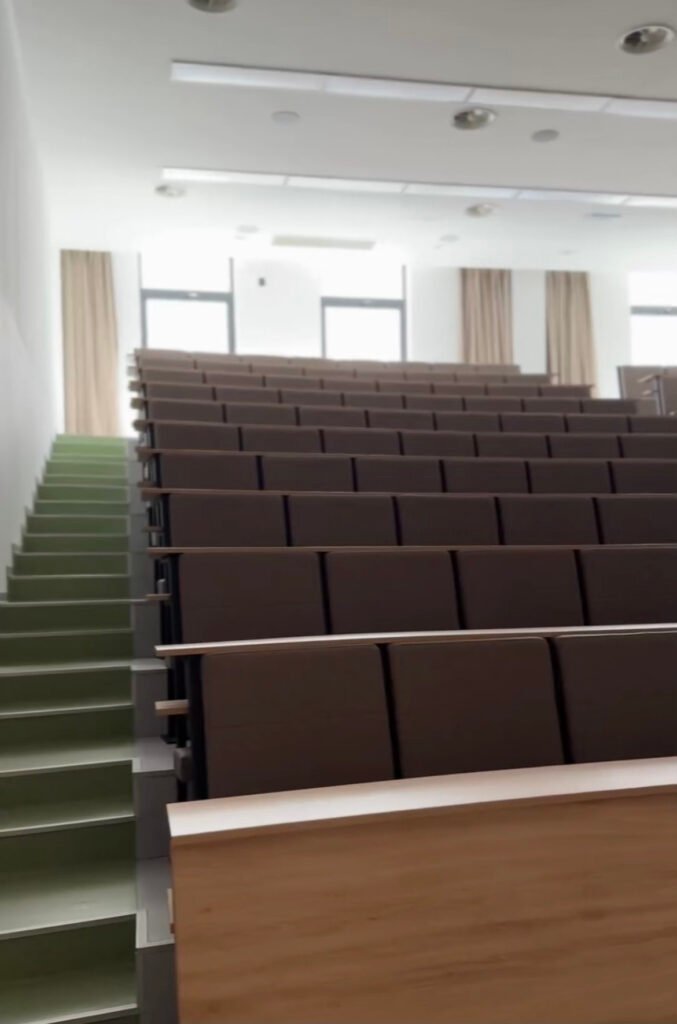
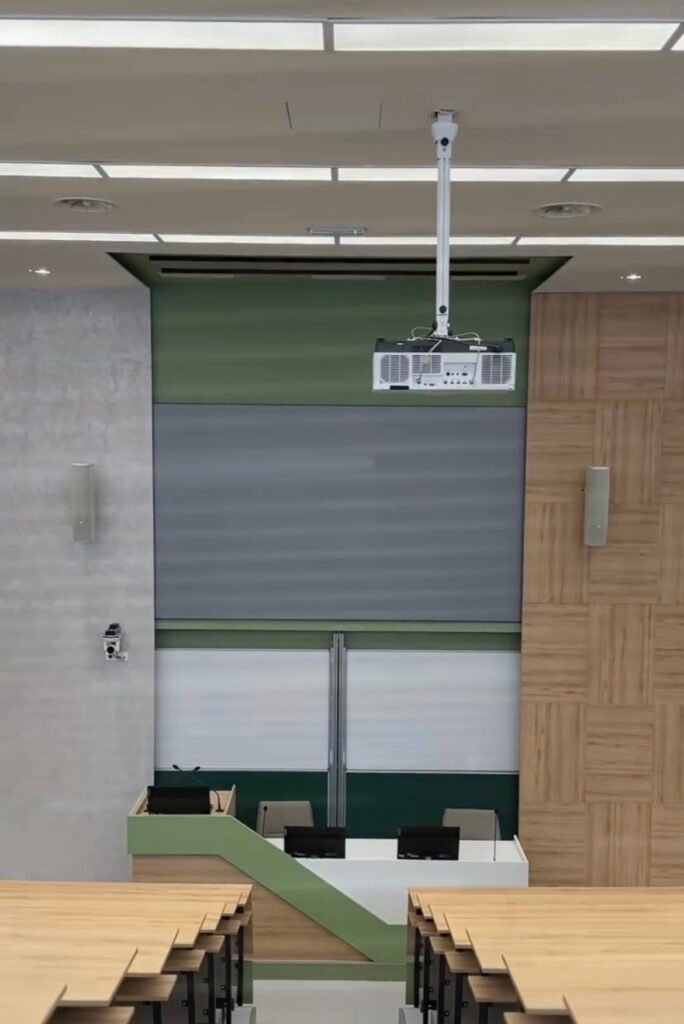
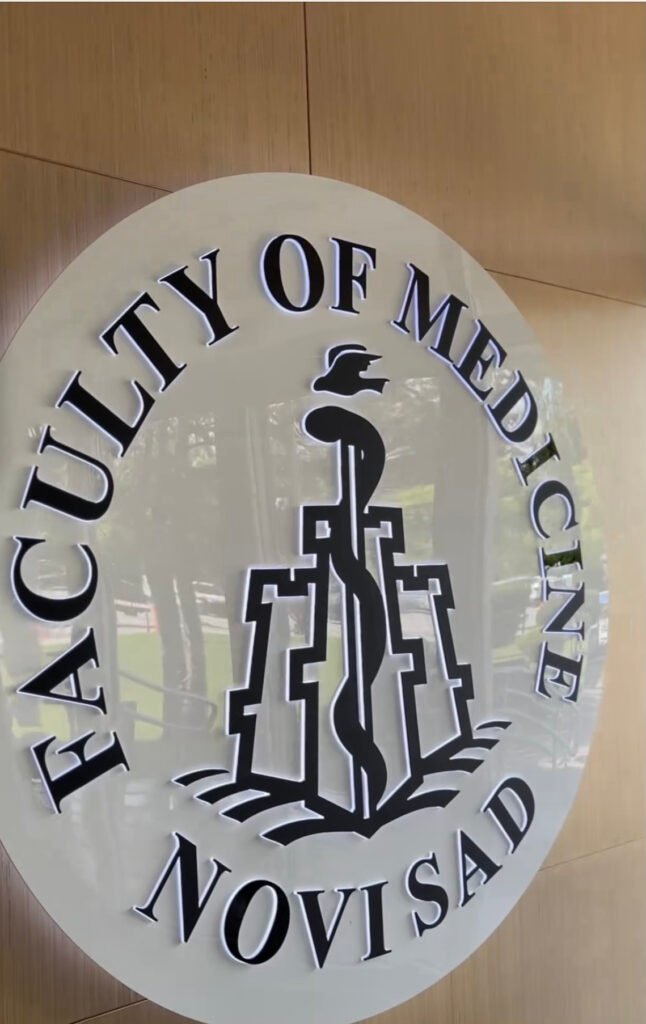
Q: Wow! 7-10 exam periods sounds insane, knowing what it’s like here in PTE.
N: Yes, but they are much shorter and it helps students prioritise and organise their exams efficiently.
Q: What was the application process like?
N: The application process was very easy and straightforward. I didn’t use an agency to apply to University of Novi Sad. Everything about the transfer process was on the school website. I didn’t do an entrance exam. I think first year students have to do an entrance exam. They will be tested on Biology and Chemistry, as well as their English language skills. I paid 50 euros for the application process. I had to submit my transfer application form, a student status certificate in the previous academic year, a transcript of records, the detailed study program – syllabus, a copy of my passport, my birth certificate and the proof of paid application fee – the 50 EUR I already mentioned. Quite a few of these documents had to be officially translated to Serbian. If I had any questions, I was able to get in contact with the school through email and they replied very quickly.
Q: What year when you in at PTE when you transferred and then at Dnipro?
N: I was in my 4th semester at PTE before transferring to Dnipro Medical Institute.
Q: What year were you accepted into?
N: I was accepted into the second year in Dnipro Medical Institute. I also finished my third year in DMI. After the war broke out, I continued my studies in University of Novi Sad and entered 4th year.
Q: How did you find the process of moving? Were you helped in anyway by UNS or did you have to figure things out there by yourself? Did you have any friends there prior to moving to help you?
N: Moving to Novi Sad wasn’t a big deal for me. Beforehand, I did a ton of research about Serbia, so I pretty much knew what to expect. UNS helped out with the visa process, so that was easy. But as for getting to know the city, I did all that on my own. And to top it off, I didn’t know a single person there before I moved.
Q: How did you find the transition process as a previous PTE student, academically and otherwise?
N: I adapted to the city very quickly. It’s quite similar to Pécs but a bit bigger, and everything is conveniently close by. The bus system is easy to navigate, and taxis are readily available if needed. The locals are incredibly friendly and always eager to assist foreigners; they truly appreciate and welcome all visitors. Plus, you’ll find that most people in Novi Sad speak English fluently, so communication isn’t an issue. Novi Sad is just a 30-minute train ride away from the main city, Belgrade, or about an hour by car. Sometimes, I head to Belgrade on weekends to meet up with students from other universities.
As for the education system, I’m really impressed. The teachers are highly knowledgeable and proficient in English, always willing to address any questions we may have. We have plenty of opportunities to interact with patients, examining various cases and learning how to approach different scenarios. The emphasis is on developing our critical thinking skills, understanding diseases, making diagnoses, considering differential diagnoses, and exploring treatment options.
Q: Please, tell us a little bit about the school system and how it differs from here.
N: So the academic year starts in October and ends in May. We have two semesters, winter and spring. During the semester, we have lectures and practicals. We usually have 20 weeks of learning. After winter semester, we have two weeks of exams. You can choose which exams you would like to take but you cannot choose the date of your exams like in PTE. You only have one chance to pass each exam in an exam period. During the spring semester, there’s an exam period in April, you can choose to do the exams you didn’t pass during the winter semester then. After the spring semester, we have exams in June, July, August, September and October. You can choose to spread your exams during these months. The requirement is you should have 37 credits done after each year.
Q: Are there opportunities for clinical practice outside of class? Something akin to the summer practices we have?
N: Yes. If we would like to get more clinical practice, the school offers us the opportunity for a summer practice. We can also contact the doctors and ask if they are free during the summer to observe them. UNS also organises events where we can practise our clinical skills as well.
Q: How are you able to interact with your peers and classmates? Do you make Whatsapp groups or Facebook groups like here?
N: Yeah, it’s pretty much the same. We interact with each other using WhatsApp and Facebook. We have Facebook groups with all the students in my year. We also have a year representative who gives us relevant information about classes and such.
Q: PTE prides itself on being very multicultural, which it absolutely is. What’s the student community in UNS like? What nationalities dominate? Do they have different programmes for different languages the way we have?
N: University of Novi Sad medical faculty is a rather small community. I would say due to the war in Ukraine, the student community here is growing both in number and diversity. We have students from Italy, Greece, Croatia, Slovenia, Bosnia, Nigeria and India. No nationality dominates one from the other. In my school, we have two programmes- Serbian and English.
Q: Are there any things you like at UNS better than in PTE?
N: Here, they really prioritise connecting with patients. We spend a lot of time digging into their medical history, which I think is super important. It’s not just about cramming or memorising information from textbooks; they really want us to be able to spot illnesses in real life. They emphasise knowing how to gather the right details from patients so we can diagnose and treat them effectively and quickly. It’s all about being hands-on and practical, you know?
Q: Oh that’s great. I do sometime feel our knowledge here can be heavily theoretical, which is good but patients don’t always present as textbook cases so it’s like what next?
N: Yup, I felt that way too at PTE.
Q: Okay, and on the more unsavoury side, what are the things that you miss from PTE at UNS?
N: Back in PTE, we had a plethora of study spots, which I really miss in our medical faculty here.
Q: That is surprising. Students here still complain about how little spots we have.
N: Then you can imagine. It’s even less here, and it’s quite tough with just one crowded study room, especially during exam crunch time. And you know what would be great? More student-led societies at our school. It would really enhance our interactions and connections with each other.
Q: UNS needs to take notes!
N: *laughs* Yeah!
Q: So, how have you found the language barrier? How does it affect learning? Did you have to learn Serbian to catch up? Do you have to use it to interact with patients in the hospital?
N: Honestly, the language barrier isn’t much of an issue for our learning. The teachers here are excellent at English, so we’re all good on that front. Personally, I’ve been here for two years and I only know a handful of Serbian words. It’s pretty bad, I know, but between classes and everything else, I just haven’t had the time to really study the language *laughs*. Unlike PTE, our university doesn’t make Serbian a compulsory subject but I wish they did. It would definitely come in handy when interacting with Serbians outside of school. Usually if the patient doesn’t speak English, the teacher or a Serbian student would translate. However if you would like to learn Serbian, there is a language club in the main university campus but you have to pay for that.
Q: Is there a possibility for extracurricular activities? Like research, surgical society, these kinds of things?
N: Absolutely. We do have a range of extracurricular activities available, which add a lot to our learning experience. For instance, the school has been proactive in organising various events like conferences and clinical practices. One noteworthy initiative was bringing in doctors from countries like the US and UK to share insights into their specialised fields. It’s incredibly insightful to hear first-hand from experts in different medical domains. Moreover, there have been specific events tailored to help with our practical skills. Last year for example, we had an event where we got hands-on practice in nursing and surgical skills. It was a fantastic opportunity to apply what we learned in class in a simulated, yet realistic, environment. These kinds of experiences really complement our academic learning and prepare us for the practical aspects of our future careers in healthcare.
Q: You are now in the rotational year. Are you able to complete it only in the university clinics or also in other places? Any opportunities for exchange programmes?
N: So, if I’m keen on doing my rotational year in another country, it’s definitely possible, but it’s more of a DIY affair. I’d need to reach out to the schools abroad and handle all the planning and logistics myself. However, the school does have some established connections with a few institutions abroad. For instance, just this year, there was an opportunity for students in their 5th and 6th years to go to Thailand for their clinical rotations. And then there’s Erasmus, which is a great program for international exchange. We actually have students from Italy who come here to spend a year studying. It’s a wonderful opportunity for cultural exchange and expanding our perspectives in medicine.
Q: Do you have to prepare a thesis as a graduation requirement?
N: Yes, I do have to prepare a thesis as a graduation requirement. It’s the last thing I would have do in sixth year. After that, I’m freeee!
Q: Naomi, I’m really so happy for you. I know how it was for us, adjusting to this crazy rigorous system, seeing how much work was put in with the results just not adding up. It takes a toll on you and you start wondering if you’re an oversight of sorts- just an impostor who somehow slipped through the cracks. I want to ask and maybe it’s a silly question after hearing all these but do you feel you made the right choice for yourself to move from PTE?
N: Absolutely, I’m convinced I made the right decision. Staying would’ve only worsened my mental well-being, I think. But you know, I’m a firm believer in the saying that everything happens for a reason and since making the move, I’ve crossed paths with some truly incredible people. Honestly, I feel more confident now than I ever did back in PTE. So yeah, without a doubt, it was the best call for me.
Q: Alright! And one last question- do you have any advice for those who are considering making such a move whether to UNS or somewhere else?
N: I’d say don’t rush into any decisions. I get it, it feels like time’s ticking away. But seriously, take your time. Look into every little detail of each school you’re considering transferring to. And here’s a tip: reach out to students already studying there. They’ll give you the real scoop on what the school’s like. But whatever you decide, make sure you’ve got a solid plan. And remember, don’t give up. Things have a way of working out in the end. You’ve got this!
Q: Is there anything else you would like to add?
N: Thank you for giving me the opportunity to talk about my experience. It was nice.
Q: And thank you as well for sharing your perspective. I’d love to do a follow-up with you as you progress in your career after UNS.
N: Of course. I’ll be happy to be a part of that.
That’s the interview for you.
If you are interested in UNS, I did the research and unfortunately, the deadline for transfers to begin in the next semester ended in June. However, I have a post detailing transfer possibilities for those who are looking to transfer both within and outside Hungary, which you can access here and here.
One thing to take note of is that many universities can only accept students based on the similarity between the medical programmes. This is one reason why universities in the UK (which typically offer 5-year MBBS programmes) or the US (which typically offer 4-year MD programmes post-grad), for example, do not accept transfer students from our programmes.
Also, you need to accept the possibility of having to lose a year when you transfer. While many of the programmes are similar, the order may not necessarily be. Some medical schools start their anatomy course from the 1st semester, while we have it from the second. Some might have immunology in the 3rd semester while we have it in the fourth. Some might even have only one or three semesters of microbiology or pathology while we have 2, so it’s something you will need to keep in mind.
Finally, I want to add that if you are trying to escape a possible termination or extra year, transferring is not necessarily the best option for you. Many of these universities also have academic requirements for transferring. Some of them require proof that you are eligible to continue in the next semester in your current institution, as well as your transcript. So transferring should not be your lifeline to keep a bad academic record going.
This is my third blog post concerning transfers. Before making any of these posts, I wrestled with the idea a little bit. I recognise the fact that doesn’t look too good to make posts that essentially encourage or provide information to current students of my alma mater to transfer. So I just want to quickly clarify this:
When I initially started this blog, I did it as a thing for students like me- those away from home with nothing but a dream, struggling through it, no idea of how things worked, barely knowing what happens outside of the classroom and how to boost their uni experience. I wanted to provide some of the information I didn’t have then. I have to give my props to PTE and say a lot has changed since I started and I have seen changes made and initiatives started to support students, especially those in the international programmes. That being said, I think of choosing a university like buying a home. It will hold you as you go through some of the most difficult days of your life and also some of the best and most rewarding days of your life. I believe it is entirely possible for a university and its system to not be your perfect fit. Naomi’s a great example of that. If you realise medicine is not for you, that’s a beneficial realisation to come to and you should definitely act on that. On the other hand, if you have the interest, passion and drive like Naomi, perhaps you’re just not in your right home. So if you need to leave, do so. There’s no use forcing a square peg into a round hole. Find your home.
Author’s note: I am ever so grateful to Naomi for agreeing to this interview and being willing to share this personal and trying experience. I wish her the best of luck as she wraps up her medical training in Novi Sad and moves even closer to her dream.
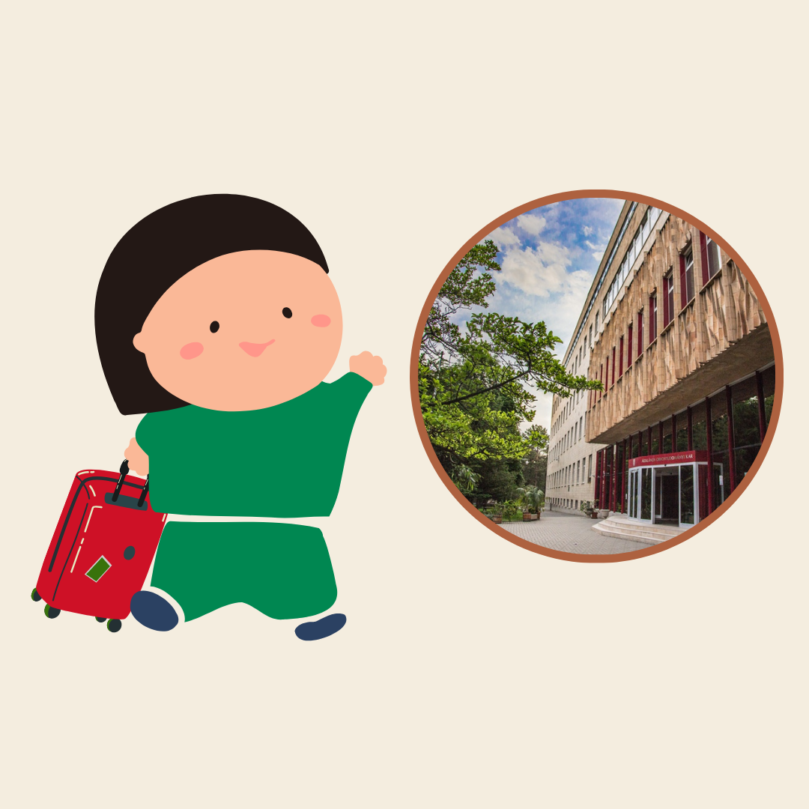
is Naomi contact-able? Anywhere we can ask her if we have some more questions?
Hi!
Yes of course. If you send me an email at aulaconversations[at]gmail[dot]com, I can provide her contact info.